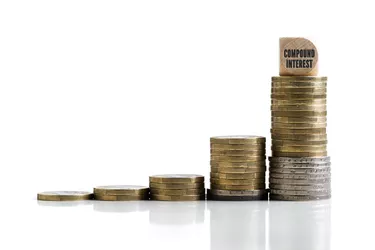
Warren Buffett, the legendary investor, once said, "My wealth has come from a combination of living in America, some lucky genes and compound interest." So, what makes compound interest so special that one of the richest people in America credits it as a source of his wealth?
Let's find out.
Video of the Day
Video of the Day
What Is Compound Interest?
In simple words, compound interest is when the interest you have earned on the principal is added to the amount and in the next period, you earn interest on your interest. Hence, the term: compound interest. The compounding frequency can be on a daily, weekly, quarterly or annual basis.
The compounding frequency makes a difference. If you're investing, the more frequently the interest is compounded, the better. In other words, daily compounding will result in a higher annual percentage yield (APY) than compounding only once per year.
If you're borrowing money, you want the interest on the loan amount to be calculated with fewer compounding periods because that will result in a lower amount of interest charged.
How Does Compound Interest Work?
To understand the powerful effects of compounding interest, consider this investment plan. Suppose you're age 25 and start out by making an initial investment of $1,000 in a stock market index fund, and you plan to contribute $100 each month to your investment account until you retire 40 years later at age 65.
Using the long-term stock market rate of return of 10 percent, by the age of 65, you would have $697,387 in your retirement portfolio. This example illustrates the exponential growth effect of compound interest.
This plan assumes you contributed only $100 per month and never increase this amount as your income grows. If you were increasing the amount of your contributions each month or making additional deposits, your retirement fund could easily approach $1 million.
But what would happen if you started with $1,000 and never added any more? At an interest rate of 10 percent, the $1,000 would be worth $54,568 after 40 years.
The compound interest formula is a little complicated, but you can use an online calculator to try out various investment scenarios that fit your personal finances.
What Is Simple Interest vs. Compound Interest?
Simple interest is only calculated on the initial principal amount whereas compound interest is calculated on the principal plus the accumulated interest. Let's take an example.
Suppose you have $1,000 invested in a savings account or certificate of deposit paying a 5 percent annual interest rate. At the end of the first year, you would receive the 5 percent interest, or $50, and it would get added to your account. You would now have $1,050 in your account.
In the second year, you would receive another $50, 5 percent on your original principal amount of $1,000. Therefore, at the end of year two, you would have $1,100. At the end of year three, you would have $1,150 in your account, and so on until maturity.
But what would happen if you were receiving compound interest on this same amount?
Using a compound interest calculator, the same initial amount invested of $1,000 receiving 5 percent interest compounded daily would have a balance of $1,162 after three years, a difference of $12 in favor of the compound interest method.
After 10 years, the difference is even starker. The account paying 5 percent simple interest would have a total balance of $1,500. Conversely, the account paying 5 percent compound interest would have a balance of $1,649.
Compound interest is a magical process that enable average people average incomes to become millionaires.
What Is the Rule of 72?
The Rule of 72 is a mathematical shortcut that lets you easily and quickly determine how long it will take to double your money at a certain interest rate.
Here's the way it works. Suppose you have an account that is paying 6 percent interest. If you divide 72 by six, the answer is that it'll take you approximately 12 years to double your money.
Or you can use the rule the other way and start with a desired period of time to double your money. Suppose you want to double your money in eight years. What interest rate would you need to earn to reach that goal?
If you divide 72 by eight, you'll find that you need to earn a 9 percent annual interest rate to double your money in eight years. If you're investing in the stock market and getting a 10 percent return, you'll double your money in a little over seven years.
How Do Lenders Use Compound Interest on Credit Cards?
Credit card issuers use different versions of compound interest to calculate the amount of interest they charge you on your balance. Typically, interest is charged based on your average credit card balance at a daily compounding rate, which results in the highest charges.
It's worth your time to go through the credit card issuers' terms and conditions in the fine print when you're considering various cards to find the one that will result in the lowest interest charges and the lowest annual percentage rate.
What Are the Advantages of Compound Interest?
Albert Einstein supposedly said, "Compound interest is the eighth wonder of the world. He who understands it, earns it. He who doesn't, pays it."
These are the advantages that Einstein saw in compound interest:
- Compound interest builds on momentum, like a snowball building up into an avalanche.
- Average people with average incomes can become millionaires.
- Compound interest creates persistence and patience with investing over the long term.
- Seeing your investments steadily grow relieves stress and gives you confidence in the future.
- Compound interest rewards everyone the same, whether rich or poor.
- Taking advantage of compound interest by consistently investing will make you richer and keep you from being broke.
- Compound interest isn't affected by race, gender or age.